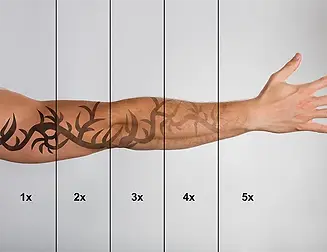TATTOO REMOVAL in Sidcup, Bexley

Laser tattoo removal is the most effective and widely used method for eliminating unwanted tattoos. It works by breaking down the ink particles in the skin using high-intensity light beams, allowing your body to gradually remove the pigment through its natural processes.
Here’s a full breakdown of how it works, the process, what to expect, risks, and aftercare.
How Does Laser Tattoo Removal Work?
-
A Q-switched laser or picosecond laser sends ultra-short pulses of energy into the skin.
-
The energy shatters the ink particles into tiny fragments.
-
Your body’s immune system then slowly flushes out these particles over time.
-
Different ink colors absorb different wavelengths of light, so multiple lasers may be used for multi-colored tattoos.
Consultation & Patch Test
-
Skin type and tattoo are evaluated.
-
A patch test may be done to test skin reaction and ink response.
-
Medical history is checked to rule out contraindications (e.g., keloid scarring, photosensitivity).
What Affects Tattoo Removal Success?
-
Tattoo Age – older tattoos fade faster.
-
Ink Color – black is easiest, green/yellow/purple are hardest.
-
Ink Depth & Type – professional tattoos are deeper and denser.
-
Skin Tone – lighter skin tones respond faster; darker skin needs gentler settings.
-
Location – areas with good circulation (e.g., face, upper body) fade quicker.
-
Immune System – stronger immune function = faster ink clearance.
Session Duration & Frequency
-
Sessions typically last 5–30 minutes depending on size.
-
Sessions are spaced 6–8 weeks apart to allow healing and pigment clearance.
What Happens Between Sessions?
-
The body continues to break down and remove ink.
-
Ink may appear faded, patchy, or uneven — that’s normal.
-
Some colors fade quicker; others (like green/yellow) may persist longer.
Side Effects & Risks
-
Redness, swelling, blistering (temporary)
-
Hyperpigmentation or hypopigmentation
-
Scarring (rare with experienced practitioners)
-
Infection (if aftercare isn’t followed)
-
Textural changes in skin (especially with aggressive treatments)
-
Paradoxical darkening of cosmetic inks (iron-based pigments can oxidize)



Procedure – What to Expect
-
Cleansing & Numbing
-
Area is cleaned, numbing cream or cooling device applied (some clinics use cold air instead).
-
-
Laser Application
-
The laser handpiece is passed over the tattoo.
-
You’ll hear snapping/popping sounds and may feel a rubber band snap or heat sensation.
-
-
Immediate Reaction
-
Tattoo may turn white (“frosting”), swell, and redden — this is normal.
-
Cold compress and soothing cream applied post-treatment.
-
Aftercare Instructions
-
Keep the area clean and dry for 48 hours.
-
Avoid sun exposure and use SPF 50+ on the area.
-
No picking or scratching if blistering or scabbing occurs.
-
Cool compresses or aloe vera can soothe the area.
-
No hot showers, swimming, saunas, or gym for 48–72 hours.
-
Avoid makeup or harsh products on the treated area.
%20(2000%20x%203000%20px)_edited.png)